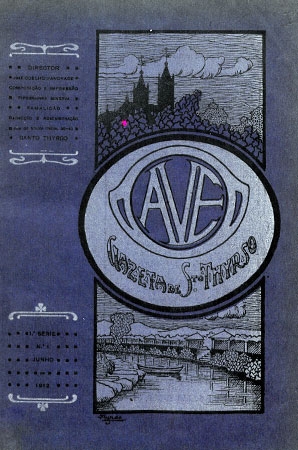
Released between 1912-13, it belongs to a batch of magazines clearly influenced by A Águia and other magazines from the north. In the first Modernism, it is worth noting the primacy of the Coimbra-Viana do Castelo axis for the emergence of literary magazines, of which this gazette is a good example. Límia (1910-11) will also be a good comparison if we look at its covers and other graphic elements, very inspired by art nouveau.
This magazine is subtitled "Gazeta de Sto. Tirso" and is published in Vila Nova de Famalicão, so, as indicated, some of the articles will undoubtedly be devoted to local history. There is a "Gallery of illustrious Tirsenses" or a section devoted to the history of the town ("Sto Tirso thirty years ago") and there is always a lot of collaboration from local people, as is the case, in the first issue, of Manoel dos Santos Marques, a blind man and braille teacher, who, in a note, we learn about inhabiting the typography of this magazine, and who thus publishes a poem, with accompanying braille, alluding to his condition.
As far as literary collaboration is concerned, it is worth noting, without surprise, the poetry of Afonso Duarte or João de Lebre e Lima, distinguished writers from the north of the country. One of the most regular collaborators here is also Américo Pires de Lima, who would be an outstanding professor at the Faculty of Medicine, and then of Science, in Porto, still a student in 1910, and who would later become a great botanist.
An unpublished sonnet is also published by Júlio Brandão in the third issue, in keeping with the magazine's bucolic tone: "Moinhos". Aside from this poem, another example of an article devoted to that province: a long article by João de Meira, a doctor and historian from Guimarães, who died a year after the magazine ended (1913), on the French and foreign influences on Eça's work de Queirós, also natural of the area (Póvoa de Varzim).
There were 7 numbers in total, the latter being completely devoted to the village mentioned in the subtitle. Its director was also a literary collaborator, still a doctor by profession, announcing his medical practice in the final pages of each issue...
Ricardo Marques
